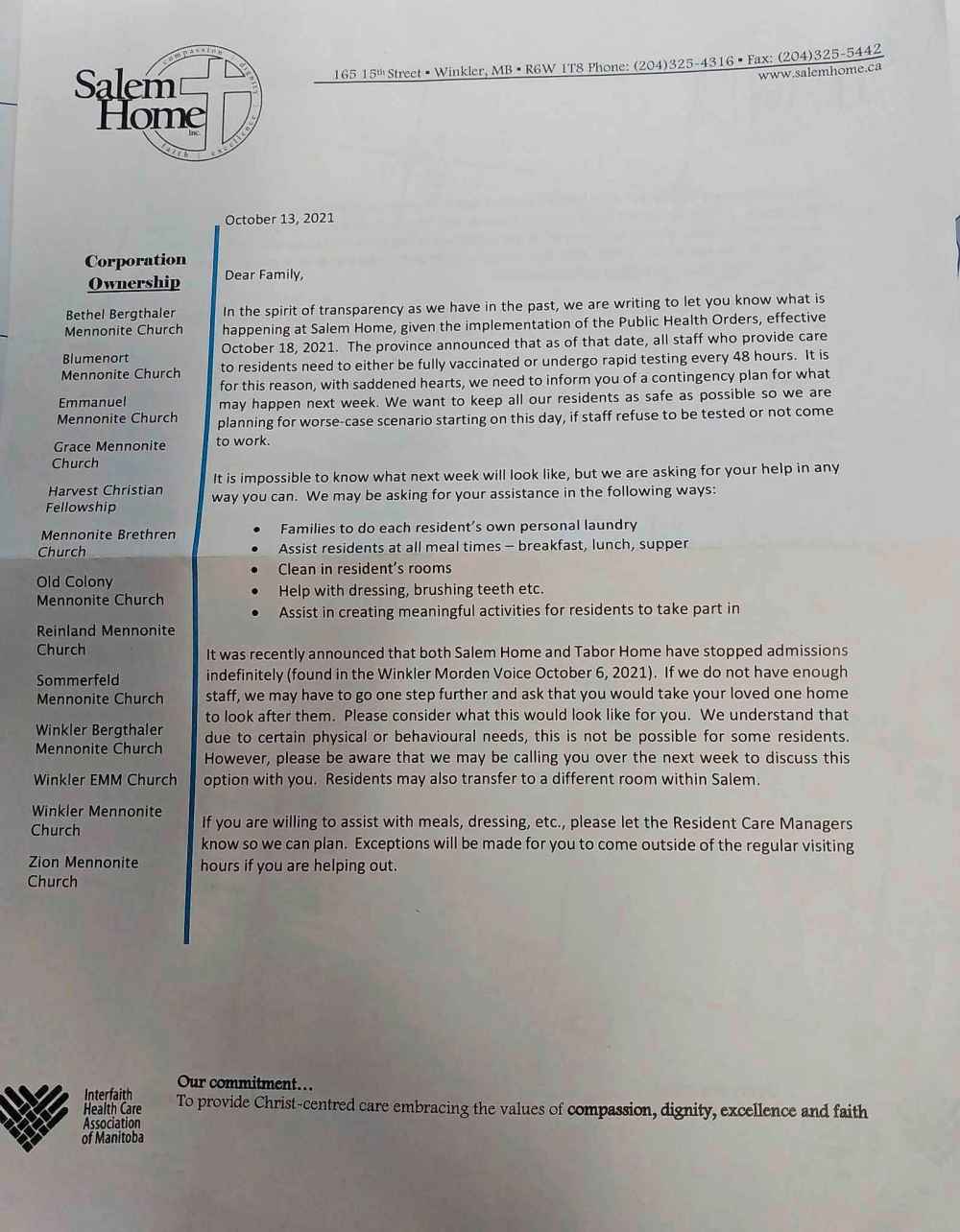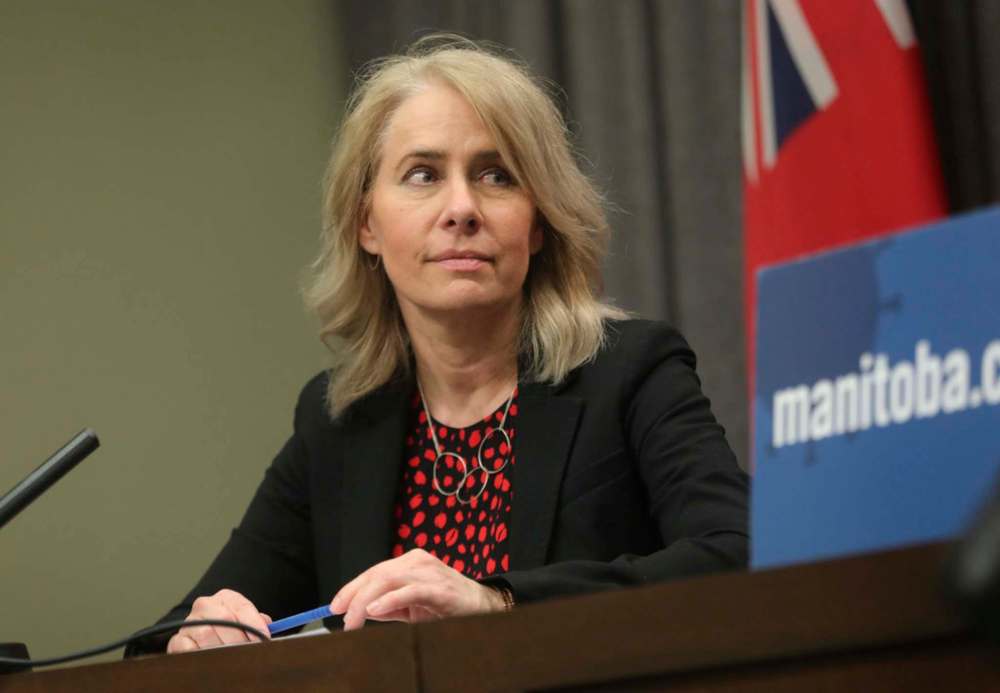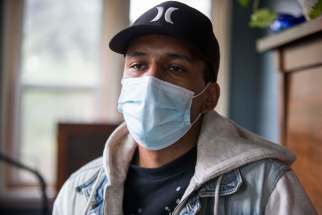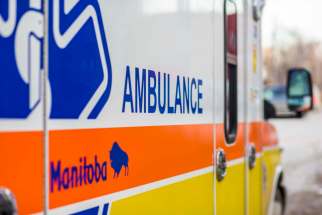No pay or benefits for unvaxxed health workers who refuse to be tested Facilities prepare for staffing shortages as of Monday
Read this article for free:
or
Already have an account? Log in here »
To continue reading, please subscribe:
Monthly Digital Subscription
$0 for the first 4 weeks*
- Enjoy unlimited reading on winnipegfreepress.com
- Read the E-Edition, our digital replica newspaper
- Access News Break, our award-winning app
- Play interactive puzzles
*No charge for 4 weeks then price increases to the regular rate of $19.00 plus GST every four weeks. Offer available to new and qualified returning subscribers only. Cancel any time.
Monthly Digital Subscription
$4.75/week*
- Enjoy unlimited reading on winnipegfreepress.com
- Read the E-Edition, our digital replica newspaper
- Access News Break, our award-winning app
- Play interactive puzzles
*Billed as $19 plus GST every four weeks. Cancel any time.
To continue reading, please subscribe:
Add Free Press access to your Brandon Sun subscription for only an additional
$1 for the first 4 weeks*
*Your next subscription payment will increase by $1.00 and you will be charged $16.99 plus GST for four weeks. After four weeks, your payment will increase to $23.99 plus GST every four weeks.
Read unlimited articles for free today:
or
Already have an account? Log in here »
Hey there, time traveller!
This article was published 14/10/2021 (1519 days ago), so information in it may no longer be current.
Get vaxxed, get tested or don’t get paid.
That’s the message Shared Health has sent to its employees ahead of Monday, when those who work directly with vulnerable populations will have to disclose whether they’ve been fully vaccinated, show proof of a negative COVID-19 test or go on unpaid leave.

That has prompted one non-profit personal care home in Winkler — where vaccine uptake is low — to warn families they might be shortstaffed and have to take their loved one home to look after them.
“It is impossible to know what will happen next week,” said a letter sent Wednesday to Salem Home families. The letter was shared in a public forum online.
Next week, new public health orders that include financial consequences for workers who won’t follow them, take effect in Manitoba.
Civil service waits for answers
Civil servants outside the health-care system, who work directly with vulnerable populations, are still waiting to find out how the Oct. 18 public health order will be carried out, says the Manitoba Government and General Employees’ Union.
“When the province announced its intention to implement an immunization and testing policy, several critical details were not provided,” said union president Michelle Gawronsky.
Civil servants outside the health-care system, who work directly with vulnerable populations, are still waiting to find out how the Oct. 18 public health order will be carried out, says the Manitoba Government and General Employees’ Union.
“When the province announced its intention to implement an immunization and testing policy, several critical details were not provided,” said union president Michelle Gawronsky.
The government didn’t say which specific job classifications would be covered by the vaccine requirement, there was no written policy with details about how personal health information will be protected, and it didn’t say how the testing would be administered, Gawronsky said Thursday.
“With just days to go before the order comes into effect, we are still no further ahead in getting answers to these critical questions,” she said.
“In fact, when we wrote to government asking for answers, we were told, ‘The Manitoba government is not implementing an immunization and testing policy, rather we are implementing processes to comply with public health orders. We will provide information on these processes by department once they are available’,” Gawronsky said.
They’re still waiting for a written immunization and testing policy for the civil service, she said. “This is unacceptable; public workers deserve clear information about how they will be impacted.”
Monday’s public health order requirements for designated employees who have direct and continuous contact with vulnerable people are pretty clear, said Central Services Minister Reg Helwer, whose portfolio includes the civil service. They either have to be vaccinated and provide proof of vaccinations to their manager, or be tested every 48 hours, he said Thursday.
“It’s the managers that work with those individuals that will determine how this is all going to be rolled out,” Helwer said.
“Every situation is unique, so to write a policy that encompasses everyone is impossible – they have different working situations, the managers that are working with their staff will find the best solution for that area.”
Helwer wouldn’t reveal the consequences for those who don’t obey the orders, saying it is a human resources issue.
“All HR issues are often very private and kept with that individual, so it’s not something that’s made public,” the minister said. He said managers can ask for guidance from the Civil Service Commission “and we’ll deal with those individual issues,” Helwer said.
“It’s the managers that are dealing with the civil servants and their workplace determining what the best action is and asking for advice in that regard. I mean, the goal here is to get people vaccinated. We want Manitobans to continue to get vaccinated and they’ve got a great response so far. We will work with those people in the workplace that aren’t.” He didn’t know how many members in the civil service have been vaccinated, but said it would reflect that of the general population.
“That information will be more readily available to the managers on Monday,” Helwer said.
“Staff who are not fully vaccinated will be required to have a current, valid negative test result prior to the start of their shift,” a spokesman for Shared Health said Wednesday, noting the “vast majority” of health-care workers has been fully vaccinated.
“Staff will be expected to complete a self-administered rapid test that, in most cases, takes place in the workplace. Testing is to be completed on a worker’s personal time, with negative test results valid for up to 48 hours.”
The province said Thursday it has shipped 1,130,700 rapid tests to 616 sites.
“Your co-operation in the days, weeks and months ahead will not only allow for the ongoing delivery of health services to those you provide care for, it will also ensure you remain able to continue working alongside the other members of your care team,” Shared Health chief nursing officer Lanette Siragusa said in a memo to all direct health-care workers.

Those who won’t prove they’re vaccinated, or get tested, can’t go to work. They won’t be paid, can’t use banked vacation, stat holiday or overtime, and no pension contributions will be made during their absence.
Making sure that employees are fully vaccinated or test negative for COVID-19 is “important additional protection for patients, residents and clients — some of whom are at greater risk of hospitalization and even death from COVID-19,” Shared Health’s spokesman said.
“Vaccines are safe, they work and they do more than just protect you and others from the virus,” he said. “They also help to protect the capacity of our health system and health-care providers to care for all Manitobans, not just those with COVID.”
Siragusa’s memo includes links to resources, evidence and data-supported information “about the safety and effectiveness of the vaccines as well as information to dispel myths about vaccination and testing.”

“There’s a lot of misinformation out there and myths. We need to remove those myths,” Health Minister Audrey Gordon said when asked how prepared the province is for Oct. 18, and the possibility that some employees won’t get vaccinated or tested and won’t show up for work.
“We have been talking with the regional health authorities’ leadership and managers at various facilities across the province,” Gordon said. “Data is still coming in for those who are fully vaccinated.”
“The plan is to work with the regional health authority leadership to remove barriers to testing and vaccination and ensure there’s a plan in place to support them with evidence and information that allays their fears,” the health minister said.
Health officials and local leaders are bracing for pushback in areas where the vaccination rate is low. Morden Mayor Brandon Burley and the Manitoba Nurses Union have said they’ve heard some personal care home workers in parts of the Southern Health region, and some Boundary Trails Health Centre employees, are planning to stay off the job starting Monday.
“There’s a lot of misinformation out there and myths. We need to remove those myths.” – Health Minister Audrey Gordon
“We are ensuring we are talking to the leadership about steps that can be taken to mitigate any large numbers of staff who may not feel comfortable working after the 18th,” Gordon said.
“We are looking at a provincial response system to what may be local issues, setting up that system to ensure facilities are provided with staffing resources they need to continue to operate,” she said.
Shared Health’s planning remains focused on ensuring appropriate levels of care continue to be provided to patients, care home residents and clients, its spokesman said. It’s providing employers with data related to the vaccination status of direct care workers by region and broken down by care setting or role.
“This information is aiding in the development of efficient rapid-testing strategies for those individuals who will require regular rapid testing. It is also supporting the development of provincial contingency plans for areas that may be impacted should staff, who have not provided proof of their fully vaccinated status, also choose not to participate in regular rapid testing,” he said.
carol.sanders@freepress.mb.ca

Our newsroom depends on a growing audience of readers to power our journalism. If you are not a paid reader, please consider becoming a subscriber.
Our newsroom depends on its audience of readers to power our journalism. Thank you for your support.
History
Updated on Thursday, October 14, 2021 11:13 PM CDT: Fixes typo.
Updated on Friday, October 15, 2021 9:13 AM CDT: Clarifies that Salem Home is a member of the Interfaith Health Care Association of Manitoba







